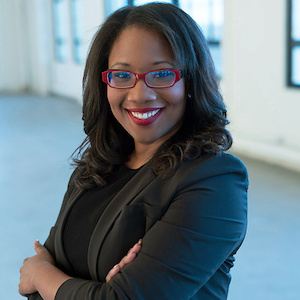The key to persevering in STEM careers is to find joy in the struggle, discover yourself in the process and lead with passion and purpose, Talithia Williams said at UC Santa Cruz’s online 39th annual Martin Luther King Jr. Memorial Convocation Feb. 21.
Williams, a big data expert who has hosted PBS programs “Nova Wonders” and “Zero to Infinity,” shared her own career journey as an African-American mathematician from self-described average student to college professor. She said her life goal is to encourage more women and people of color to pursue careers in science, technology, engineering and mathematics. “You have a right to take up space in STEM,” she said. “Really believe it and act accordingly.”
Williams said she never thought about herself as a potential mathematician until her high school teacher, “an old white guy” in Georgia, told her she was talented in math and should consider majoring in it in college.
She took his advice and studied math at Spelman College, a historically black college for women in Atlanta, where she met her first black female scientist. “She was a visual example of what I could one day become,” she said.
From there, she enrolled in a graduate program in biostatistics at Howard University, a historically black college in Washington, D.C. She then transferred to a doctoral program at Rice University in Houston, which was her first experience not at a historically black college.
Things were different. At a math conference, she was asked if she was at the right place. “I had these slight microaggressions at different moments that made me wonder if this was where I should be.”
But she did earn her PhD and went on to work at the NASA Jet Propulsion Lab in Pasadena and the National Security Agency. She wrote the book Power in Numbers: The Rebel Women of Mathematics, about 30 women who broke through obstacles to follow their dreams in STEM and gave a popular TED Talk, “Own Your Body’s Data,” about how high-tech self monitoring can improve your health.
Those who want to follow in her footsteps should find joy in the struggle by getting support from friends, family and other communities. She has a husband and three children, and said having a family has always been very important to her.
Williams said it’s important for everyone to discover themselves in the process as they pursue their STEM studies. For instance, discovered that she really loved making math enjoyable and understandable to those who find it difficult. That love led her to host the PBS shows. She didn’t have a 5- or 10-year plan to be on a TV show; it just unfolded as she followed her passion day by day. Williams also cited the example of Kizzmekia Corbett, an African-American immunologist who helped with the development of the Moderna Covid-19 vaccine. Williams said she probably never guessed she would be part of such a historic project.
Finally, Williams said it’s important for women and people of color to lead with passion and purpose. For her, this has meant organizing conferences for girls to meet women scientists and participating in mentorship opportunities.
Williams shared how her long interest in data, health and society evolved with the onset of the COVID-19 pandemic. She was impressed with how Johns Hopkins shared its data on the virus putting out more information in the hands of the public than ever before. People began posting photos of themselves getting the shot on social media. “All of the sudden with Covid-19 we were sharing our very personal health data,” she said.
She was surprised when her mother was reluctant to get the shots. Her mother said remember what happened with the Tuskegee Study, a 40-year experiment in Alabama to study untreated syphilis in black men. The men were recruited without their consent and were offered free food and medicine to participate but were not offered penicillin as treatment. This went on from 1932 to 1972 when an Associated Press story exposed the experiment. Decades later, President Bill Clinton formally apologized for it.
Williams said many people besides her mother remember that dark time and their perspectives should be taken seriously. Experts should listen to lived experiences and consider that as data as well. “We would do ourselves a service by valuing that data and making it part of our decision making,” she said.
Williams said anyone who has a passion for STEM should keep pursuing that field even if it is difficult and they don’t do well on a difficult course or test. She reminded students they can always try again and they shouldn’t give up on the first try. There is always a way to move forward. “Make sure you take time to discover that thing that brings you passion and joy,” she said.



